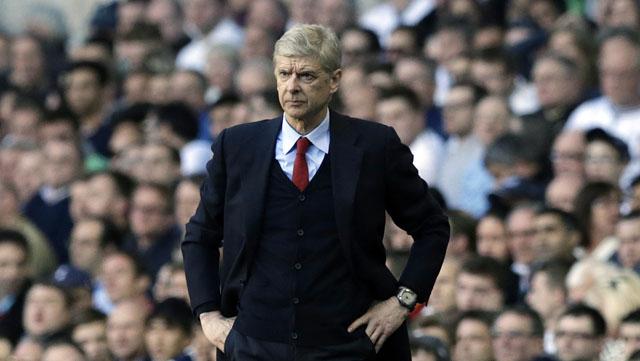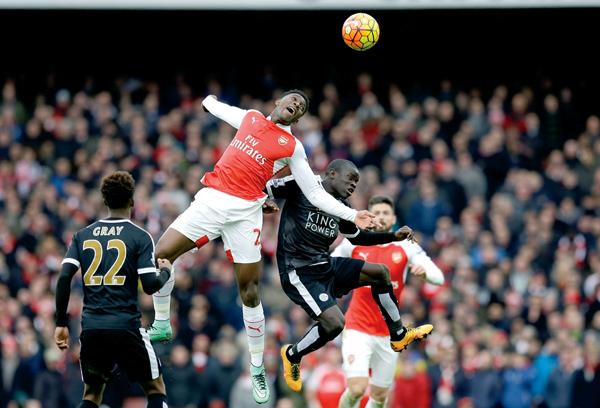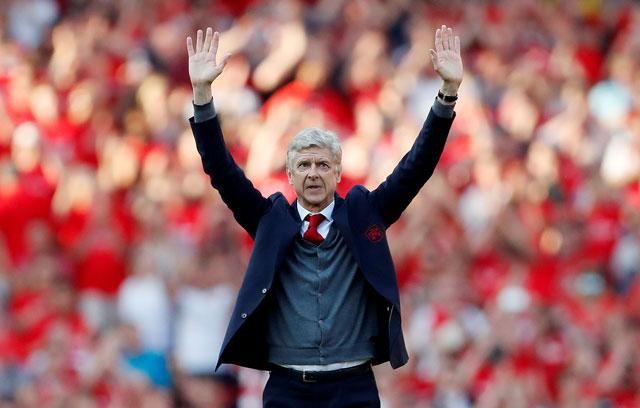You are here
Wenger reaches milestone with 1,000th Arsenal game
By AP - Mar 20,2014 - Last updated at Mar 20,2014

LONDON — "Arsene Who?"
That famous headline in a London newspaper welcomed the relatively unknown Arsene Wenger when he was appointed Arsenal manager in September 1996.
Many players at the club had the same question on their lips when the Frenchman walked into the dressing room for the first time.
A little less than 18 years later, Wenger will take charge of his 1,000th game as Arsenal manager when his team plays at bitter rival Chelsea on Saturday.
And despite the former Monaco coach’s inability to deliver a trophy since 2005, Wenger's achievements in north London and his influence on English football have been immense.
Not only has Wenger presided over glory days at the club — Arsenal won three Premier League and four FA Cup titles under Wenger, including the double in 1998 and 2002 — he also achieved sporting and financial stability at Arsenal.
The club's longest-serving manager is also widely credited for having radically changed the face of English football, bringing in new training methods and his famous broccoli diet while discouraging alcohol consumption.
First regarded as something revolutionary, Wenger's attention to detail quickly became popular among his players.
"At first, we didn't really know who Arsene Wenger was," said former England and Arsenal midfielder Ray Parlour. "But we trusted [vice chairman] David Dein at the time, him saying Arsene Wenger was going to push the club forward," Parlour added.
"And certainly after six weeks or so you could tell that he was a top-class manager. When Arsene Wenger first turned up, he took me to another level.
"His training methods were always great, he was on that pitch every single day, which is so important as a coach. He had lots and lots of brains about football and what he wanted to achieve."
Wenger arrived at Highbury on the back of successes at Monaco and a stint in charge of Japanese club Grampus Eight to become Arsenal's first foreign manager following short-term tenures for Stewart Houston and Bruce Rioch.
Arsenal finished third that season but Wenger won over the fans' hearts the next term when he led his team to the Premier League title with two games to spare after trailing leaders Manchester United by 11 points at one stage.
The Gunners then added the FA Cup to secure the double in Wenger's first full season in charge.
Over the years, the Frenchman built a squad capable of fighting for the title every season, with the likes of Nicolas Anelka, Patrick Vieira and Emmanuel Petit added to a roster including David Seaman, Tony Adams and Dennis Bergkamp. But Wenger's real masterstroke was signing Thierry Henry.
The World Cup winner arrived in August 1999, after Wenger's side had been denied back-to-back titles by one point by Manchester United.
After failing to score in his first eight games, Henry netted 26 goals that season and went on scoring 226 times in 369 appearances for Arsenal between 1999 and 2007, winning seven trophies in his time in north London.
"He changed the philosophy of the club," Henry said. "He won stuff as soon as he arrived and therefore he earned the trust of the fans and the respect of everyone."
Unlike his great rival Alex Ferguson, who retired last season after turning Manchester United into a European powerhouse, Wenger has not tasted Champions League success.
Despite qualifying for the lucrative tournament for 16 consecutive seasons, Arsenal has never won Europe's biggest prize, losing to Barcelona in the 2006 final.
Wenger is now trying to end a trophy drought stretching back to the 2005 FA Cup.
Over that period, the fans' patience has been tested but they never turned their backs to the Frenchman as he stayed truthful to his ideal of beautiful football while rebuilding the team and guaranteeing the club's financial health.
"I believe that when one day I look back, certainly I will be very proud of what I have done," Wenger recently said about those difficult times.
"It was a trophyless period but certainly a much more difficult and sensitive period, and we needed much more commitment and strength than in the first part of my stay here.
"I went for a challenge that I knew would be difficult because we had to fight with clubs who lose £150 million [$248 million] per year when we had to make £30 million [$50 million] per year."
Last year, Wenger told The Associated Press that he had tried to adopt a "socialist model" for Arsenal's wage bill.
That philosophy is harder to sustain when the pressure for short-term success gets bigger and Wenger broke Arsenal's transfer record last summer to sign Mesut Ozil for 50 million euros ($66 million).
"I always say to the players, 'Forget the money'," Wenger said.
"What is important is how well you play together, what you share together is much more important. The money is only a consequence of your experience," he added.
"The real experience is the game."
Related Articles
LONDON — After 10 months out injured, Danny Welbeck took barely 10 minutes on his return from surgery to score a precious goal for Arsenal.T
LONDON — Arsenal manager Arsene Wenger signed off in style as they thrashed Burnley 5-0 in his last Premier League home game on Sunday with
LONDON — The destination of the Premier League trophy will not be decided when current champions Chelsea meet their immediate predecessors M



















